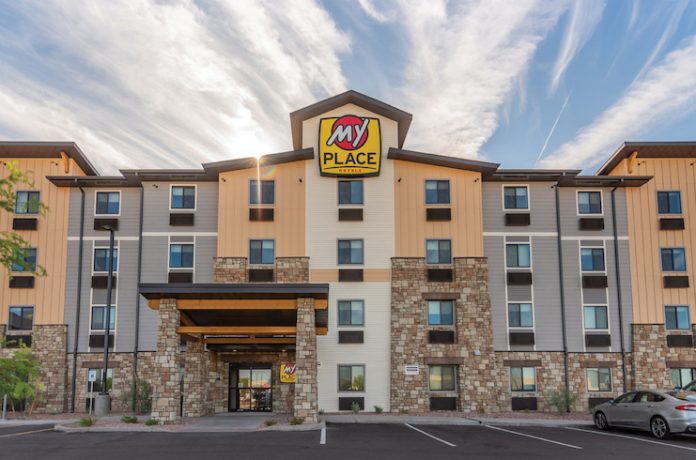At this year’s My Place Convention, My Place Hotels President and CEO Ryan Rivett shared a major milestone at the opening general session: 100 franchises sold. Founded in 2014, My Place is still a relatively new player in the extended stay market despite this growth, but one that is built upon a nearly 50-year family legacy of success in hotel brand development. Ryan’s grandfather, Ron Rivett, cofounded Super 8 Motels in 1974, opening the first property in Aberdeen, South Dakota. Ron sold the Super 8 brand in 1993 and went on to cofound My Place Hotels, focusing on the same proven concept of clean, comfortable, and affordable lodgings for both leisure and business guests—but adding the capacity to accommodate extended stays. Every concept needs a prototype, and the first My Place hotel opened in Dickinson, North Dakota in 2012.
“Our family legacy in this business has really been a foundational element of why we’ve been as successful as we have,” shares Terry Kline, executive vice president of franchise development. “When I came in to start the franchising effort in 2014, there were four proof-of-concept properties that Ron and Ryan had built to test and tweak both the product and the operations. So, the basis was there to begin telling the story and start selling franchises.”
 As a young, entrepreneurial brand, My Place enjoys certain advantages, Kline feels. “The canvass of the country for development is still really open, even having reached that 100-franchise mark,” he says. “Our franchisees and developers like that the brand is fresh and consistent, and the fact that markets are available. And this brand is our only focus, unlike major brands that have a dozen other brands with different names the franchisee is competing with.”
As a young, entrepreneurial brand, My Place enjoys certain advantages, Kline feels. “The canvass of the country for development is still really open, even having reached that 100-franchise mark,” he says. “Our franchisees and developers like that the brand is fresh and consistent, and the fact that markets are available. And this brand is our only focus, unlike major brands that have a dozen other brands with different names the franchisee is competing with.”
Currently, 66 My Place hotels are open in 29 states, representing the brand’s three different prototypes of 46, 64, and 85 rooms, respectively. “All are built new from the ground up, and it will always be that way,” says Kline. “They fit efficiently on available land [e.g., the 85-room model requires as little as two acres] and have a low build cost. And while they look the same on the inside, we’re flexible on the exterior design to match the aesthetics of different areas of the country.” Along with variance in the exterior, such as the Urban vs. the Chalet look, comes some adaptability in onsite “extras” for guests depending on the location.
Approach to Amenities
“Certain markets, such as Moab, Utah, are very leisure oriented. So, a franchisee there may choose to do a pool or a grilling pavilion,” explains Eric Myers, vice president of franchise development. “But in general, most My Place hotels are scaled back on the amenity side, because we really focus on the operator’s perspective as far as bringing profits to the bottom line, while still giving the guest enough of the amenities that they really need. As far as oversized lobbies with bars and all the amenities that usually don’t get overly used, they really are a detriment to the bottom line. We want to avoid having a franchisee expend capital costs on developing underutilized space; we want it to be as efficient as possible.” With this approach, My Place hotels can operate with just eight to 10 employees, keeping staffing costs at a minimum. On the other hand, the brand doesn’t cut corners on the amenities guests will definitely find useful. “We have a little My Place Store, which is nice so they don’t have to run to a convenience store; guest laundry facilities; a full-size refrigerator; a cooktop and microwave—everything you really need to stay for two months if you wanted to,” Myers describes.
Setting up Franchisees for Success
For a relatively small company, My Place offers franchisees a robust infrastructure of support throughout the timeline of their project, from site selection and architectural planning to FF&E sourcing to opening coordination and initial operations support from the My Place University team. Located in Aberdeen, My Place University offers ongoing training and online resources for general managers and administrators. In addition, franchisees benefit from a national sales team, marketing support ranging from collateral design to local market analytics, a property management system, a revenue management, and business intelligence service, established vendor relationships, and even a quality assurance team that visits each hotel quarterly.
Of course, franchise success remains a joint effort, and My Place ensures that capable operators are representing the brand. “We interview prospective franchisees just like they interview us,” says Kline. “We want to make sure that good operators are going to take over when we’re allowing them to put our name on it. But we do have a very diverse group: construction professionals, attorneys, and doctors, for example, and we’re starting to get more big hotel developers as franchisees.” The idea is to grow the brand via steady, secure steps. “We’re not a public company, we’re a private family company, so we’re not subject to pressure to grow for the sake of shareholders on Wall Street,” Kline adds. “Our stakeholders are our franchisees. So, even as we continue to build and reach a critical mass, it’s still very important that each franchisee opens a successful outlet. That’s been the objective from the start.”
Promising Outlook
Part of what explains My Place’s resiliency during the pandemic is its specialization in the midscale extended stay segment, which still has plenty of growth potential. “The extended stay segment still only represents a little over 10 percent of the overall number of rooms in the hospitality industry,” Kline points out. “I can remember back in 2014/2015 when it represented a little under 8 percent. That’s really a small amount of growth, but I know it’s going to continue because operators and developers to want to create a balance in their portfolio with this kind of product. So, we’re very optimistic going forward.”
From the operations perspective, Myers notes, “We’ve seen really good increases in ADR from last year to this year. And even though that might level off a little bit, I think we still have room for ADR increases.” During the next two quarters, he expects several newly opened members of the My Place family will benefit from that performance.
Recent Guest Demographics
The My Place brand offers franchisees a good mix of both leisure and business clientele, and transient and extended-stay guests. The breakdown, based on data from Jan. 1 to Dec. 31, 2021, is as follows:
- Transient leisure: 31.81 percent
- Transient corporate: 15.01 percent
- Extended leisure: 15.79 percent
- Extended corporate: 37.4 percent
In terms of length of stay, 47 percent of guests stay for one to six nights; 20 percent for 7-29 nights; and 33 percent for more than 30 nights.











